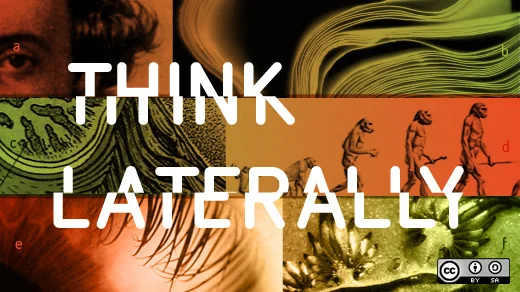When Thomas Friedman enumerated 10 "flattening forces" in his book The World Is Flat, he declared that force #4, Open Source, was the most powerful and disruptive of all. New discoveries in nature suggest that Friedman's assessment may be more profound (and more consistent) than even he imagined.
Friedman notes that open source engenders a feature rarely seen in previous publishing endeavors: uploading. Traditionally, publishing followed a waterfall model: some marketable idea or expression would find some capital partner and the two would join to create a work that could be purchased or otherwise consumed by a downstream market. Ideas flowed in one direction, and capital returns would flow in the opposite direction.
Open source created a bi-directional flow in which the market itself could make greater intellectual contributions than any of the original principals. Moreover, this could often be accomplished without any particular capital partner. Whereas piracy was seen as the scourge of the private property publisher, ubiquitous distribution was a necessary prerequisite for open source participation.
Traditional publishers and capitalists wrongly claim that open source turns the basis of intellectual property on its head, but I disagree. I think it merely turns them sideways.
Long before Friedman, Alexis de Tocqueville was writing about another flattening of the world: American Democracy. He seized upon the idea that Democracy and Equality were profoundly related concepts, the former operating in a world of politics and the latter observable in the natural world.
By this device he was able to instantly perceive how America, unshackled from central controls and authority, could create the most favorable conditions for innovation:
When a private individual mediates an undertaking, however directly connected it may be with the welfare of society, he never thinks of soliciting the cooperation of the Government, but he publishes his plan, offers to execute it himself, courts the assistance of other individuals, and struggles manfully against all obstacles. Undoubtedly he is often less successful than the State might have been in his position; but in the end the sum of these private undertakings far exceeds all that the Government could have done.
Not only does this sound like a great description of open source software vs. proprietary software, but it actually describes quite accurately my own experience starting the world's first open source software company. (And though it may surprise some, I take great pride in the fact that the Government is now embracing open source just as quickly as it can--the best ideas are those that are good for all, not just some.)
It also explains the relative benefit of horizontal interaction vs. vertical integration. (To read more about this, check out The Only Sustainable Edge which really does that subject justice.)
But among the dozens of subjects he considers and the hundreds of insights that illuminate them, he, like Friedman, holds up one as more significant than all the rest: The Law of Descent (or, in this translation, the Law of Inheritance):
But the law of inheritance was the last step to equality. I am surprised that ancient and modern jurists have not attributed to this law a greater influence on human affairs. It is true that these laws belong to civil affairs; but they ought, nevertheless, to be placed at the head of all political institutions; for they exercise an incredible influence upon the social state of a people, while political laws show only what this state already is. They have, moreover, a sure and uniform manner of operating upon society, affecting, as it were, generations yet unborn. Through their means man acquires a kind of preternatural power over the future lot of his fellow creatures. When the legislator has once regulated the law of inheritance, he may rest from his labor. The machine once put in motion will go on for ages, and advance, as if self-guided, towards a point indicated beforehand. When framed in a particular manner, this law unites, draws together, and vests property and power in a few hands; it causes an aristocracy, so to speak, to spring out of the ground. If formed on opposite principles, its action is still more rapid; it divides, distributes, and disperses both property and power. Alarmed by the rapidity of its progress, those who despair of arresting its motion endeavor at least to obstruct it by difficulties and impediments. They vainly seek to counteract its effect by contrary efforts; but it shatters and reduces to powder every obstacle, until we can no longer see anything but a moving and impalpable cloud of dust, which signals the coming of the Democracy.
de Tocqueville properly predicts that the tendency of proprietary software, which tends to be treated as indivisible property, is to create at least aristocracies, and in degenerate cases, monopolies. And his writing is strangely prescient about open source software as well, but let me pick that up at the end.
There is one more writer I must invoke before introducing the actual subject of this article, and that is Charles Darwin. Darwin's theory of evolution is a staggering contribution to science. Read naïvely, the theory predicts the survival of the fittest. As such it is no more insightful than the economic theory that says "buy low, sell high".
Read more deeply, the theory is based upon the evidence of the survival of the most adaptable, and that theory has proven not only durable in the community of life sciences, but in virtually every field in which competition and risk over time play a role, i.e., virtually every human endeavor. Our fascination with fitness likely comes from the fact that it is so easily (and instantly) measured. The study of adaptability takes time. But it can also lead to much deeper insights.
Consider the evolution of the eye. Darwin considered this at once to be "absurd in the highest possible degree" and yet he wrote:
...if numerous gradations from a perfect and complex eye to one very imperfect and simple, each grade being useful to its possessor, can be shown to exist; if further, the eye does vary ever so slightly, and the variations be inherited, which is certainly the case; and if any variation or modification in the organ be ever useful to an animal under changing conditions of life, then the difficulty of believing that a perfect and complex eye could be formed by natural selection, though insuperable by our imagination, can hardly be considered real.
And as far as the fossil record can tell us, once the basis of photoreceptivity appeared, then from that origin it has evolved independently at least 50-100 times. In that regard possession of this feature follows the law of inheritance in that if your parents had eyes, you probably do, too. But the advantage of this feature cannot be determined by examining the feature itself: The human eye, which from a design perspective is "built backwards and upside-down" compared with the elegant design of the eye of the octopus, nevertheless confers a degree of adaptability that makes irrelevant the details of that unfortunate design.
But now we know that genetic advantages are not only inherited. And they are not only conferred by genetic engineering. Consider Elysia chlorotica:

Photo credit: Nicholas E. Curtis and Ray Martinez
This sea slug discovered in the waters of the Atlantic ocean may be one of the most dramatic examples of lateral gene transfer. It appears that rather than relying on natural selection of random mutations of its inherited genetic code to achieve greater fitness, somewhere along the line Elysia chlorotica went from shepherding algae as a captive food source (symbiosis) to incorporating the gene psbO into its own DNA, thereby allowing it to integrate a photosynthetic process based on chloroplasts without any algae present. Now a "solar-powered sea slug", Elysia chlorotica can feed itself for almost a year just by laying about in the sun.
Lateral gene transfer is understood to be have been fairly common among very simple single-celled organisms, and the more closely we examine various genomes, the more we see that there is much more to evolution than stepwise refinement of inherited wealth.
In the world of open source, on example of such lateral transfer has been the development of GTK (now GTK+). Started initially as a toolkit for the GNU Image Manipulation Program (GIMP), GTK+ now supports dozens of desktop environments, window managers, and applications. Many other open source technologies have been born in one context, refactored for use in other contexts, broken out as stand-alone projects, and then reincorporated in yet new programs for new purposes.
To return briefly to de Tocqueville's vision, recall:
They vainly seek to counteract its effect by contrary efforts; but it shatters and reduces to powder every obstacle, until we can no longer see anything but a moving and impalpable cloud of dust, which signals the coming of the Democracy.
Whereas proprietary software tends to remain monolithic, in part because none of its constituent elements have any independent value whatsoever if broken apart, modular open source systems transcend the logic of partition and fragmentation. One thousand people can take copies of Linux source code and yet there is still a complete copy for the original developer and yet another copy for the 1,001st who wants a copy.
All this copying does not dilute the strength of Linux, but by contrast only makes it stronger and more valuable in the marketplace. This is the effect that a share-alike license like the GPL provides to Linux and all who follow its prescription of equality. And today we see the unstoppable growth and insatiable appetite for open source in the enterprise. Could it be that de Tocqueville's logic properly predicted the advent and effect of open source cloud computing?
Back to the main topic at hand...
Mathematically speaking, the combinatorial possibilities of lateral evolution between multiple domains far exceeds what can be supported by restricting evolution to only that which can occur in a single domain.
Moreover, the adaptive potential of such cross-pollination must be far superior than any approach that attempts to adapt whole systems to work only with other whole systems, even when such whole systems follow rigorous interoperabilty guidelines.
Suddenly it becomes obvious that when the world is flat, when evolutionary innovation can take lateral pathways, when we have the legal, technical, and operational freedom to adopt the most sensible approaches of the best designs, regardless of their ancestry--or our own--then we see the kind of adaptability that ensures its own survival.
And we see that those who don't enjoy that kind of adaptability heading one step closer to extinction.






4 Comments